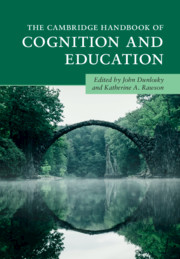Book contents
- The Cambridge Handbook of Cognition and Education
- The Cambridge Handbook of Cognition and Education
- Copyright page
- Contents
- Figures
- Tables
- Contributors
- How Cognitive Psychology Can Inform Evidence-Based Education Reform
- Part I Foundations
- Part II Science and Math
- Part III Reading and Writing
- Part IV General Learning Strategies
- 16 When Does Interleaving Practice Improve Learning?
- 17 Correcting Student Errors and Misconceptions
- 18 How Multimedia Can Improve Learning and Instruction
- 19 Multiple-Choice and Short-Answer Quizzing on Equal Footing in the Classroom
- 20 Collaborative Learning
- 21 Self-Explaining
- 22 Enhancing the Quality of Student Learning Using Distributed Practice
- Part V Metacognition
- Index
- References
17 - Correcting Student Errors and Misconceptions
from Part IV - General Learning Strategies
Published online by Cambridge University Press: 08 February 2019
- The Cambridge Handbook of Cognition and Education
- The Cambridge Handbook of Cognition and Education
- Copyright page
- Contents
- Figures
- Tables
- Contributors
- How Cognitive Psychology Can Inform Evidence-Based Education Reform
- Part I Foundations
- Part II Science and Math
- Part III Reading and Writing
- Part IV General Learning Strategies
- 16 When Does Interleaving Practice Improve Learning?
- 17 Correcting Student Errors and Misconceptions
- 18 How Multimedia Can Improve Learning and Instruction
- 19 Multiple-Choice and Short-Answer Quizzing on Equal Footing in the Classroom
- 20 Collaborative Learning
- 21 Self-Explaining
- 22 Enhancing the Quality of Student Learning Using Distributed Practice
- Part V Metacognition
- Index
- References
Summary
- Type
- Chapter
- Information
- The Cambridge Handbook of Cognition and Education , pp. 437 - 459Publisher: Cambridge University PressPrint publication year: 2019
References
- 6
- Cited by

